Welcome to the Missouri Conference of AAUP. If you are a member of the national AAUP, you are also a member of MOAAUP. Not a member of AAUP? Have you let your membership lapse? Join Here
No AAUP chapter on your campus? You can still join AAUP.

Fontbonne University’s chapter of the American Association of University Professors (AAUP) is hosting a panel discussion about Critical Race Theory (CRT). Four panelists with different areas of professional expertise will explore what CRT is – and isn’t – and its potential impact on education at all levels. The interface between legislative approaches to direct teaching and learning about race in America, and the principle of academic freedom, will also be addressed.
The event is scheduled for Tuesday, October 4, from 4:00-5:30 in the Lewis Room of the Fontbonne University library. Admission is free and open to all members of MO-AAUP. Parking will be available on campus that afternoon without the need for a Fontbonne University permit.
CURRENT ISSUES IN SHARED GOVERNANCE AND ACADEMIC FREEDOM
As the pandemic continues to pose its own challenges, what are some of the important issues related to shared governance, academic freedom, faculty rights, and tenure at universities and colleges across the state? If your campus faces any of these issues, please remember that MOAAUP, and the AAUP National are here to help. Please feel free to contact any of the elected officers. Let us know what we can do to assist you.
SOUTHEAST REGION AAUP CONFERENCES AND CHAPTERS FORM COALTION TO ENACT VACCINE MANDATES
AAUP leaders from ten states across the Southeastern portion of the United States have formed a coalition to urge state lawmakers to enact COVID vaccine mandates for public universities and colleges. Led by faculty from universities in Georgia, the group cites public health concerns as the driving force behind their efforts.
COVID MEASURES AROUND THE STATE
Universities and Colleges Requiring Face Masks
Columbia College
Lincoln University
Saint Louis University
Truman State University
University of Missouri
University of Missouri-St. Louis
University of Missouri- Kansas City
Missouri University of Science and Technology
Washington University
William Jewell College
Universities and Colleges Requiring Vaccines
Culver Stockton College
Rockhurst University
William Jewell College
Saint Louis University
Washington University
Truman State Urges Action on Covid
TSU AAUP Position Statement: COVID Vaccination
With a new federal administration comes the promise of a coordinated
national plan to address the health crisis that thus far has cost over
400,000 lives in the United States and counting. Such a plan affords all
of us the reassurance of accelerated production and a fair and equitable
distribution of the vaccine which will lead us out of the pandemic.
The logistics of such a plan, organized federally and carried out on
state and local levels, are daunting: from the adequate manufacture and
distribution the vaccine to the large numbers of health care
professionals required to administer the shots. Governmental openness
and clarity about the principles governing the tiered system of vaccine
priority is admirable and generally persuasive: those most /vulnerable/,
whether due to health status or probability of exposure, and those
/essential/ to the fundamental functions of our society, are afforded
priority. Unquestionably, health care workers qualify on both counts.
The elderly, in particular those housed in institutional settings where
contagion has been known to spread readily, are also at the highest
level (Phase 1A) of priority for vaccination. The rationale is clear,
and the necessity obvious.
Only slightly lower in priority are K-12 faculty and staff, currently in
Phase 1B-Tier 3, entitled “Critical Infrastructure.” Who could begrudge
the people tasked with the education of our nation’s children this
guarantee of safety? After all, they are essential to our children’s
future success, and they are exposed consistently to an age group
notable for asymptomatic harboring of the virus.
Higher Education faculty and staff, however, have not been included in
this priority tier. The 1.5 million employees engaged in teaching nearly
20 million college and university students who are the nation’s next
generation of innovators, professionals, and teachers are surely as
essential as K-12 faculty and staff to the country’s future.
Furthermore, these employees are even more likely to be exposed to
asymptomatic students than K-12 employees. A recent (January 2021) CDC
analysis reports that 18-24-year-olds accounted for 57 percent of cases
for those under 24, while 34 percent were attributable to the entirety
of K-12 children. The study reasonably concludes that in-person higher
education classes are likely to be more risky than in-person elementary
schools. The faculty and staff in Higher Education are both as
/essential/ yet even more /vulnerable/ than the K-12 employees currently
listed at Phase 1B-Tier 3 for vaccination access. Despite this,
Missouri’s Higher Education employees have been relegated to Phase 2,
entitled “Equity and Economic Recovery.”
We, the faculty at Truman State University, take our responsibility to
our students seriously, putting ourselves at risk with the in-person
instruction in which student learning prospers. We are willing to bear
that risk fairly on the basis of clear categories of vulnerability and
essential services. At present, however, the Missouri State Tier system
does not clearly reflect such fairness. A shared threat can bring people
together—whether nations, communities, or institutions. For the sake of
the students of today and productive citizens of tomorrow, we call upon
Governor Parson to address this clear inequity by placing Higher
Education faculty and staff in the same vaccination tier as K-12
teachers and employees.
/Executive Council of the Truman State University (TSU) chapter of the
American Association of University Professors (AAUP)/
/Please sign our petition demanding equal prioritization for
post-secondary workers as for our pre-K-12 counterparts
<https://urldefense.com/v3/__http://chng.it/XdrPGvbY6w__;!!K543PA!Y6qzBNswf10LODQ8kKZe51IPhQiZToCRmu7-h_uQ8f27iNrvGxiNXKQbStM8Hg$ >./
==========================
/The mission of the American Association of University Professors (AAUP)
is to advance academic freedom and shared governance, to define
fundamental professional values and standards for higher education, and
to ensure higher education’s contribution to the common good. For more
information, visit //https://urldefense.com/v3/__https://aaup.truman.edu/*__;Lw!!K543PA!Y6qzBNswf10LODQ8kKZe51IPhQiZToCRmu7-h_uQ8f27iNrvGxiNXKRwMRthlQ$
<https://urldefense.com/v3/__https://aaup.truman.edu/__;!!K543PA!Y6qzBNswf10LODQ8kKZe51IPhQiZToCRmu7-h_uQ8f27iNrvGxiNXKTtu4a4qg$ >/.//
/
Note: You are receiving this email as a member (or former member) of the Missouri Conference of the American Association of University Professors (AAUP). For more information, see https://urldefense.com/v3/__https://www.moaaup.org__;!!K543PA!Y6qzBNswf10LODQ8kKZe51IPhQiZToCRmu7-h_uQ8f27iNrvGxiNXKTDTS6bhQ$ . If you no longer wish to receive these occasional messages, send an email to members-request@lists.moaaup.org?subject=unsubscribe.
_______________________________________________
members mailing list
members@lists.moaaup.org
https://urldefense.com/v3/__http://lists.moaaup.org/listinfo.cgi/members-moaaup.org__;!!K543PA!Y6qzBNswf10LODQ8kKZe51IPhQiZToCRmu7-h_uQ8f27iNrvGxiNXKS5sLNVeA$
AAUP VIRTUAL TOWN HALL – TUESDAY, AUGUST 11, 2020 AT 2:00
If you are an active member of the AAUP (meaning you have paid dues), you should have received an email inviting you to join a virtual town hall on Tuesday, August 11, at 2:00. We will discuss COVID planning across the state, with someone from each institution giving a brief summary of what is happening on their campus. The ultimate goal is to develop a set of recommendations or guidelines for use across the state. Please see the COVID Resources page for a working list of issues of interest.
MIZZOU IN THE NEWS: UNIVERSITY PRESIDENT TELLS DISSENTERS THEY SHOULD REMAIN SILENT
Following a series of tweets from an employee and a local journalist criticizing Mizzou’s decision regarding the statue of Thomas Jefferson on its campus, university President Mun Choi gave an interview to The Columbia Daily Tribune. According to the Tribune:
“Choi used the tweets as examples of the kind of dissent from university staff that he said undermines the mission of the university.
Choi called senior leaders in the chancellor’s office, the president’s office, the provost’s office and deans and last Monday [via Zoom] to tell them he expects people who disagree with decisions to remain publicly silent.”
Further details can be found at https://www.columbiatribune.com/news/20200717/mun-choi-tells-university-leaders-to-back-his-decisions
Choi shared a PowerPoint presentation during the Zoom meeting and also, it seems, with the Tribune. While it is framed as a discussion of diversity and inclusion, it makes for an interesting read.
https://www.columbiatribune.com/assets/MO36667717.pdf
UMKC CHAPTER IS BACK!
Great news. The AAUP chapter at University of Missouri Kansas City is back up to full speed. Check out their new website, https://umkcaaup.org/. It joins the newly revitalized/formed chapters at Webster, University of Central Missouri, SEMO, and Saint Louis University in re-mobilizing over the past several months.
If you wish to start a new chapter, or re-start a dormant chapter, please contact any of us on the board, or check out the national AAUP website for more information. The officers of MOAAUP are here to help.
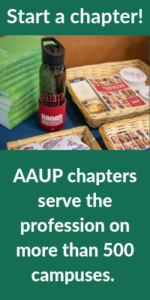
Welcome Back, Saint Louis University Chapter
Thanks to the tireless efforts of many people, but particularly Silvana Siddali at SLU, the chapter has been revived!
Please be aware that if your chapter has fewer than seven dues paying AAUP members, it is no longer considered to be an active chapter by the national AAUP. Interested in reviving your chapter or starting one? Please contact Kathryn Kuhn, Jason McCollum, John Harms, or any of the members of the executive board. Please note that David Robinson is taking some needed time off.
SUMMER INSTITUTE IS FREE THIS YEAR AND ONLINE
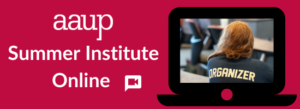
Those of us who have been fortunate enough to attend prior Summer Institutes (held by the national AAUP) have found them immensely rewarding and informative. Due to COVID 19 this year’s institute is entirely online and free of charge. Please do note, however, that space is limited, so it is best to sign up as early as you can.
Here is the announcement from AAUP:
In just a few months, the world of higher education has changed. That’s why there’s a new AAUP Summer Institute this year: it’s on your screen and it’s free.
From July 7 to August 4, we will run two webinars each week. Our 90-minute sessions will cover a wide range of topics, from campus decisions about reopening to supporting student protests to pushing back against austerity budgets. In addition, hour-long breakout sessions after the governance and organizing webinars will provide a special opportunity for smaller groups of attendees to brainstorm about how to apply the guidance to their chapter’s circumstances. There is also a special plenary panel that will highlight the experiences of frontline health care providers during the COVID-19 pandemic.
You can view the complete schedule and register for these webinars today.
Administrations across the country reacted to the ongoing pandemic by laying off faculty and staff, closing programs, and drafting reopening plans without faculty input. But if we’ve learned anything from fighting such austerity measures in the past, it’s that we can win a better future for our students, the profession, and our communities when we organize together. We can’t wait for the pandemic to end before we fight for the future of higher education.
Space is limited, so sign up today. For questions about Summer Institute Online, please email summerinstitute@aaup.org.
David Kociemba
East Coast Organizer
AAUP SHARED GOVERNANCE WEBINAR SLIDES AVAILABLE
AAUP condcted a very informative webinar on shared governance in the context of COVID 10. They were kind enough to share the PowerPoint slides with all members. Here is a PDF of the PowerPoint presentation.
Membership Status: A Gentle Reminder
It is easy to let membership in the AAUP lapse, so please check to be sure you are still an active member. Worried about dues? The AAUP offers the option of deducting your membership dues automatically each month from your bank account or paying through credit card. You do not have to pay for the entire year at once.
Welcome New Chapters!
Chapters are Southeast Missouri State, the University of Central Missouri, and Webster University have recently been formed, or reactivated. Thanks to the leadership of all those involved, faculty members at these campuses now have a greater voice in maintaining shared governance and academic freedom here in Missouri.
If you are on a campus that does not have a chapter, please consider organizing one. The board of MOAAUP is happy to help in any way.
News From National AAUP Meeting, June 13-16, 2019
Organizational Changes to the AAUP
“We are pleased to announce that the AAUP will be moving forward with organizational changes after affirmative votes at last week’s AAUP annual meeting and AAUP Collective Bargaining Congress regular meeting. Both bodies voted overwhelmingly to proceed with a package of changes that combines the AAUP-CBC and the AAUP. The AAUP-CBC will no longer exist as a separate entity and its programs will be transferred to the AAUP. This will streamline our governance and organizational structure to ensure that we are using our resources to support our chapters and conferences.”
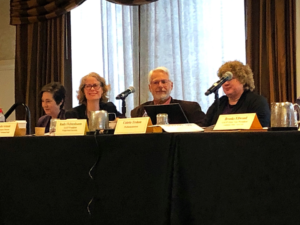
Below: On the left is Rudy Fichtenbaum, President of the AAUP
On the right is Hank Reichman, Chair of Committee A.
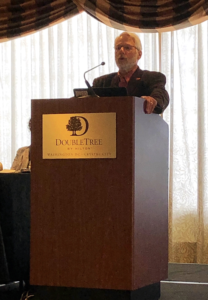
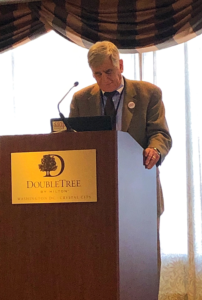
Now, more than ever, the AAUP is an important voice for academic freedom and shared governance. In states such as ours, chapters are vital to the ongoing protection of these crucial principles. What can chapters and state conferences do?
— Institutionalize AAUP policies. Faculty manuals and handbooks should incorporate explicitly AAUP principles and policy recommendations. Having an AAUP chapter and coordinating efforts across the state is one way of ensuring that these issues are addressed.
—Speak Truth to Power. National AAUP and your state conference stand ready to offer resources, organizing help, and speakers to assist all faculty in the state. As Cary Nelson writes:
“The most immediate difference an AAUP chapter can make is to be a source of frank, honest, and forthright commentary on nearly every aspect of campus life. A chapter, moreover, is not a voice crying in the wilderness. Whenever possible, it should represent the consensus view of a core faculty group formally recommending actions, issuing warnings about real problems, and deflating administration hyperbole about false emergencies. An AAUP chapter provides the faculty with a voice that can shed sunlight on cant, self-interest, and deception and applaud good practices. Then, of course, the chapter needs to promote solutions to problems.” (see https://www.aaup.org/article/aaup-chapter-can-transform-your-campus#.XQ7tBuhKiUk0)
— Organize Faculty locally and at the state level. Most of us face similar challenges. The AAUP affords us both the mechanism by which we can address those challenges ad the opportunity to engage with our colleagues at other institutions.
The AAUP is as strong as its membership base. If even a fraction of faculty become members the influence of the organization, the number of programs it offers, and the resources it has available will grow enormously.

MOAAUP SPRING CONFERENCE, 2019
News from this year’s conference and minutes from the April 28, 2018 at the University of Missouri, Kansas City are posted on the MOAAUP Conference Page.
AAUP NATIONAL CONFERENCE
The 2020 AAUP conference will be the last annual conference. Following that, the conference will be biennial. Date and location of next year’s conference are TBA.
AAUP REPORTS AND POLICIES ON ROLE OF FACULTY IN CASES OF FINANCIAL EXIGENCY
These reports expand the definition of financial exigency to include cases such as those that have recently arisen in Missouri. They are a valuable resource for those interested in understanding the role of faculty in budgeting, academic reorganization, and governance.
https://www.aaup.org/report/financial-exigency-academic-governance-and-related-matters

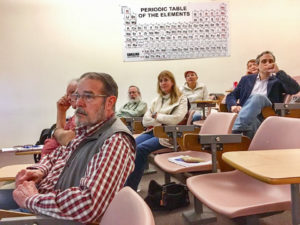
MOAAAUP — DEFENDING ACADEMIC FREEDOM AND SHARED GOVERNANCE ACROSS MISSOURI

